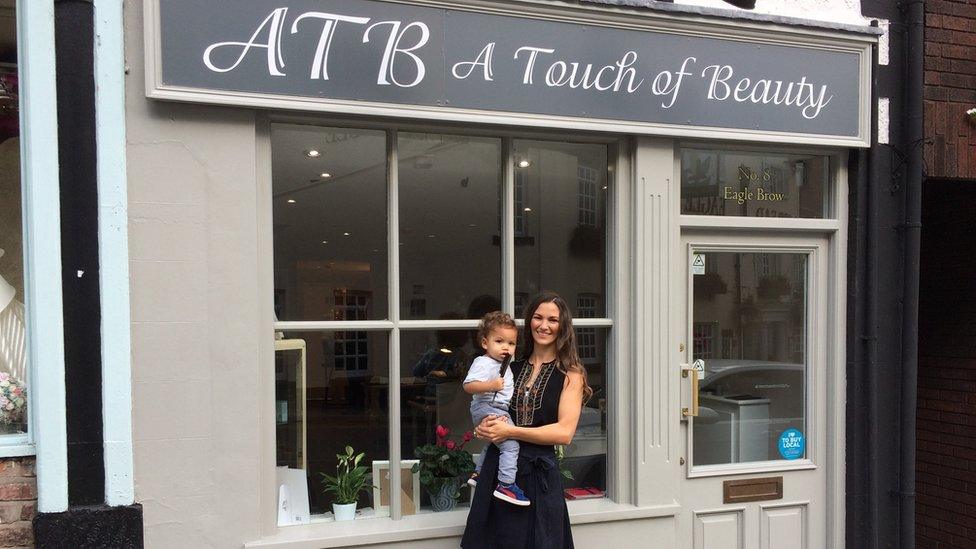Low paid 'miss out on flexible working'
- Published
Kellie Simmons from Manchester quit her job because she was refused flexible working and set up her own beauty salon
"That's it, I quit."
That's what many of us want to do when we feel our employer is being unfair, but few of us, especially with two young children, have the courage to go through with it.
But that's exactly what Kellie Simmons from Manchester did when the company she worked for refused to give her flexible working.
Kellie's experience is common for those earning less than £40,000, research suggests.
High earning parents who make more than £70,000 a year are much more likely (47%) to work flexibly than those earning between £10,000 and £40,000, according to a poll of 1,000 working parents carried out by the charity Working Families.
The research also found the majority of working parents regularly put in extra hours at work, with a quarter saying they worked at least five extra unpaid hours a week.
Perhaps more heart-rending, 56% of parents said it interfered with their ability to put their children to bed.

Parents who earn more than £70,000 a year are much more likely to work flexibly
"We know flexible working makes business sense across the salary spectrum, so why should only the people who earn the most be able to reap the rewards?" asks Sarah Jackson, chief executive of Working Families.
"We want jobs at all levels to be advertised as flexible. And this should be the norm, rather than the exception."
Subtle jibes
Kellie first broached the idea of flexible working with her employer, a charity in the education sector, when she was on maternity leave with her second child.
Initially they said yes and allowed her to work from 9.30am to 4pm - with reduced pay - for six months.
These flexible hours enabled Kellie to drop off her children at childcare in the morning and "see them grow up in the early evening," says Kellie.
But at work she says she had to endure subtle jibes.
"Colleagues would say things like 'well had you been at the early morning meeting today you'd know about x, y and z.'
"It wasn't an easy environment to work in and I felt constantly under pressure, despite the fact I was contracted to work fewer hours and was getting paid less," recalls Kellie.
After six months she asked for an extension as her youngest was still only 11 months old. But her company declined and suggested instead that she took an unpaid career break and returned in six months on her old hours.

Kellie Simmons now runs her own beauty salon, A Touch of Beauty
Kellie decided she was not going to put up with the lack of flexible working.
Within days of being told flexible working conditions were not an option, she made the decision to leave her job and set up her own business.
She gambled her savings on converting a run-down shop on Cheshire's Lymm high street into a modern beauty salon complete with crèche facilities for clients who pop in for a manicure or blow dry.
"It's early days, but it's going well so far," smiles Kellie as she juggles 18-month-old Isaac in one hand while overseeing her beauty staff in the salon.
"I can take my eldest boy to school in the morning and pick him up in the afternoon and also take my youngest to nursery three days a week while still earning decent money."

Flexibility can be beneficial for both employers and staff, business bodies say
The Confederation of British Industry says employers that don't offer flexibility are short-sighted, arguing it benefits both companies and the wider economy.
It says "offering jobs at every level on a flexible basis will help companies to recruit and retain the people and skills that are needed to compete".
The Federation of Small Business (FSB), which represents small firms, agrees saying flexibility is an important way to retain staff.
"Our research shows 80% of small businesses offer or would consider offering flexible working opportunities to their staff.
"We know three quarters of our own membership currently have at least one member of staff working flexibly, including part-time, staggered hours, home working, or flexi-time," says FSB chairman Mike Cherry.
- Published29 April 2016

- Published2 February 2016
